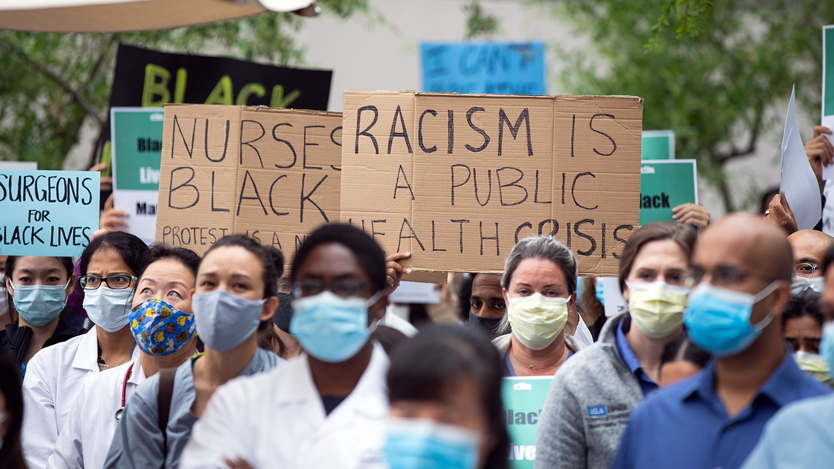Anti-racism Roadmap
We Chase Equity
We have a collective commitment to combat structural racism

Over the summer of 2020, the David Geffen School of Medicine (DGSOM) at UCLA created and launched the Anti-racism Roadmap (ARR), a co-created path toward racial justice, equity, diversity and inclusion.
Roadmap Focus Areas
Combating structural racism requires structural change.
The ARR symbolizes an institutional commitment to eradicating structural racism and consists of 11 preliminary focus areas, each including multiple goals. To ensure adequate resourcing, the dean pledged $5M in funding over three years to kickstart this work.
- Require inclusion of annual diversity reports and action plans to address culture, inclusion and anti-racism in the annual department and program budget submission and meeting. Develop a grading system to evaluate Deans, Department Chairs and Institute/Program Directors on culture, inclusion and antiracism, and make this a core component of consideration for reappointment.
- Data transparency: Collect and publicly report data on diversity in all school programs (including demographics of faculty, trainees, staff, and data on demographics of individuals receiving special opportunities, awards and honors).
- Use these data to develop key performance indicators to track the impact of anti-racism initiatives and programs.
- Transparently report data diversity in DGSOM school leadership, department chairs, institute/center directors, Research Theme Chairs, Endowed Chairs, program directors (including residency and graduate programs), and Faculty Executive Committee.
- Align the definition of merit and reward structures within the DGSOM to reflect diversity and inclusion initiatives and contributions in all mission areas.
- Partner with Bruin X, HR, campus Discrimination Prevention Office (DPO), Title IX Office and UCLA HR Staff Diversity & Compliance Office, the Committee on Learning Environment Oversight (CLEO), and others to identify, implement and evolve strategies that improve reporting processes and impacts.
- Partner with the UCLA Staff Diversity & Affirmative Action/EEO Compliance Office to set annual workforce affirmative action goals and benchmarks for women and populations underrepresented in medicine.
- Increase provision of FTE and Endowed Chairs to BIPOC faculty.
- Address the minority tax that falls on BIPOC faculty, trainees and staff.
- Develop a program for the basic science departments in the DGSOM to increase diversity in the DGSOM basic science faculty, building on the success of programs such as the UCLA Life Sciences mentorship faculty search program.
- Develop proactive retention programs, including targeted mentoring to members of groups that are at higher risk for leaving academia.
- Develop pathways for promising BIPOC postdoctoral trainees and clinical fellows/residents to become faculty.
- Identify and implement additional antiracism strategies (e.g., blinded resumes, screening enhancements, etc.).
Create a committee to include prior participants in these programs to:
- Review past pathway programs and reinstitute previous programs where data demonstrated success
- Evaluate current and proposed pathway programs
- Develop recommendations for future programs including mechanisms to evaluate
- Transparently report the diversity of the clinicians in BWC, and use the same search criteria as above to ensure diversity increases over time.
- Review mental health resources with BWC with a specific focus on addressing the harm caused by racism.
- Begin annual seminars for graduate students from diverse communities to come to UCLA, present research, and assist in finding potential postdoctoral opportunities. Explore other strategies to increase BIPOC postdoctoral scholars.
- Promote and provide administrative support for minority supplements for NIH grants.
- Develop and sponsor health disparities/ health equity annual research symposium to highlight work done at UCLA.
- Develop research funding for pilot grants that center on issues of health equity.
- Develop longitudinal junior faculty sponsorship and mentorship program to help career development.
- Enhance the resources and awareness about clinical trials (through the CTSI) in order to:
- Lessen barriers for entrance and full participation in clinical research to improve diversity in clinical trials.
- Recognize that the designation of race is a social construct in clinical trials.
- Ensure IRB protection for individuals from vulnerable populations who participate in clinical research.
- Require anti-racism training during the first six months of onboarding new staff, faculty and trainees.
- Require annual subset of anti-racism trainings for all DGSOM community members, including, but not limited to:
- Staff, faculty and trainees.
- DGSOM leadership, including all at a deans level (vice, senior associate, associate, assistant, department chair, department vice chair, or director).
- FEC committee members.
- All EDI committee members.
- All primary educators.
- Individuals who work directly with medical or graduate students.
- All mentors for PhD and postdoctoral trainees (program developed by Graduate Programs in Bioscience, they are working on this both at a local and national level).
- All who receive NIH or comparable funding should be required to undergo this and culturally aware mentorship training.
- Provide resources and education to DGSOM community on critical topics of privilege, allyship and dialogue, encouraging self-reflection, self-awareness and a shared sense of responsibility for advancing social justice in science, medicine and health care.
- Require anti-bias and anti-racism training for all search committee members.
- Launch a Cultural North Star-EDI Ambassadorship. Trained individuals will be compensated through credits or other means and will become a local resource.
- Develop an advisory committee to include experts in critical race theory, social justice, bias and health disparities (including faculty outside of the school of medicine).
- Advisory committee will review and recommend curricular changes with regards to social justice, health equity and racism in medicine (will span content revisions, basic science lectures, PBL and doctoring cases, placements for clinical experiences, classroom methods, teacher training, and associated curricular, co-curricular, and extra-curricular activities).
- Recommendations will be implemented by DGSOM education leadership.
- Develop toolkit for anti-racism and inclusive teaching in the classroom and on the wards that will be available to all faculty and staff.
- Provide faculty development on inclusive and anti-racism teaching methods.
- Include health equity topics as a requirement in each major clerkship.
- Ensure that faculty and residents/fellows are also educated in health equity issues as they pertain to their specialty.
- Implement transparent reporting of diversity in medical school training programs (MD, GME, graduate, postdocs).
- The medical school class should reflect the population of the State of California. A strategic plan will be developed to increase the number of URiM students at DGSOM using guidelines from UC Health, UCOP and our peer UC medical schools.
- Continue to engage trainee representatives on the Admissions and Selection Committees.
- Admissions and selection committee members, interviewers and readers will continue to be required to receive annual anti-bias and anti-racism training.
- Continue collaboration with Admissions Committee, APOC and FEC to review and improve diversity to reflect the population of the State of California.
- Enhance participation in future medical student recruitment by diverse medical students and EDI Office.
- Engage in strategic planning to improve diversity for all UCLA Health professional students using data-driven, evidence-based approaches.
Identify opportunities at DGSOM that will diversify our built environment and landscape.
- Partner with new Chief Diversity Officer for the UCLA hospital system and team to advance a shared agenda of equity, diversity, inclusion and anti-racism.
- Participate in an overarching UCLA Health (UCLA hospital system and DGSOM) Diversity, Equity and Inclusion Council to be cochaired by the CEO of the UCLA hospital system and the Dean of the DGSOM.
- Collaborate on clinical and learning environment, assuring equal levels of accountability for problematic behavior in either environment.
- Launch a “Share your power” campaign. Analyze and revisit the composition of all standing Committees and Task Forces and revisit the charge of all Committees and Task Forces.
- Develop a robust communications strategy, including rapid response to urgent situations, proactive and sensitive communications, and data transparency
On Wednesday, December 7th, the ARR leadership team kicked off a series of updates on the Anti-racism Roadmap (ARR). During the event, members of the team overviewed the ARR's history, purpose, and structure before they suggested ways for the 100+ attendees to advance antiracism in their unique spheres of influence. During subsequent events members of the team will discuss structural advancements and setbacks in each of the 11 preliminary focus areas.
Submit a noteworthy accomplishment
Did we overlook an effort related to one of the ARR’s focus areas? Tell us about it by filling out the form below.
